- Home
- J. D. Robb
Midnight in Death Page 3
Midnight in Death Read online
Page 3
Palmer slipped a perfectly knotted noose around Wainger’s neck and meticulously slid the trailing end through a metal ring in the ceiling. Leading it down, he threaded it through another ring in the floor, then pulled out the slack until Wainger rose to his knees, then his feet, and began gasping for air.
“Stop it, will you?” Nadine leapt to her feet. “I can’t watch this again. I thought I could. I can’t.”
“Stop disc.” Eve waited until the screen went blank, then went over to crouch in front of Nadine. “I’m sorry.”
“No. I’m sorry. I thought I was tough.”
“You are. Nobody’s this tough.”
Nadine shook her head and, finishing her brandy with one deep gulp, set the snifter aside. “You are. You don’t let it get to you.”
“It gets to me. But this is for me. I’m going to have a couple of uniforms come and take you home. They’re going to hang with you everywhere until Palmer’s down.”
“You think he’ll come after me?”
“No, but why take chances? Go home, Nadine. Put it away.”
But after she’d asked Roarke to take Nadine downstairs to wait for the escort, Eve finished watching the disc. And at the end her eyes met Palmer’s as he moved toward the camera.
“Subject Wainger died at midnight, December twenty-fourth. You’ll last longer, Dallas. We both know that. You’ll be my most fascinating subject. I have such wonders planned for you. You’ll find me. I know you will. I’m counting on it. Happy holidays.”
THREE
Stephanie Ring’s car was still in its permit slot in the garage. Her luggage was neatly stowed in the trunk. Eve circled the vehicle, searching for any sign of struggle, any evidence that might have been dropped and gone unnoticed during the snatch.
“He’s got two basic MOs,” she said, as much to herself as to the uniforms waiting nearby. “One is to gain entrance into the victims’ homes by a ruse—delivery, repair, or service con; the other is to come on them in an unpopulated area. He spends time getting to know their routines and habits, the usual routes and schedules. He keeps all that in a log—very organized, scientific, along with bio data on each of them.”
They weren’t lab rats to him, she mused. It was personal, individualized. That was what excited him.
“In either case,” she went on, “he uses a stunner, takes them down quickly, then transports them in his own vehicle. Security cameras operational in here?”
“Yes, sir.” One of the uniforms passed her a sealed package of discs. “We confiscated them for the last three days, assuming that the subject may have stalked the victim previous to her abduction.”
Eve lifted a brow. “Miller, right?”
“Sir.”
“Good thinking. There’s nothing more you can do here. Go home and eat some goose.”
They didn’t exactly race away, but neither did they linger. Eve put the package in her bag and turned to Roarke. “Why don’t you do the same, pal? I’ll only be a couple of hours.”
“We’ll only be a couple of hours.”
“I don’t need an aide to do a pass through Ring’s apartment.”
Roarke simply took her arm and led her back to the car. “You let the two uniforms go,” he began as he started the engine. “Everyone else on Palmer’s list is under guard. Why aren’t you?”
“We covered that already.”
“Partially.” He reversed and headed out of the garage. “But I know you, Lieutenant. You’re hoping he’ll shuffle the order and come after you next. And you don’t want some big-shouldered uniforms scaring him off.”
For a moment she just drummed her fingers on her knee. In less than a year, the man had learned her inside and out. She wasn’t entirely comfortable with that. “And your point would be?”
He nearly smiled at the annoyance in her voice. “I admire my wife’s courage, her dedication to duty.”
“You tossed in ‘my wife’ to irritate me, didn’t you?”
“Of course.” Satisfied, he picked up her hand, kissed the knuckles. “I’m sticking, Eve. Deal with it.”
The pass through Stephanie Ring’s apartment was no more than routine, and it turned up nothing but the tidy life of a single career woman who enjoyed surrounding herself with attractive things, spending her city salary on a stylish wardrobe.
Eve thought of the naked woman crouched like an animal in a cage, screaming in terror.
He’s killing her now. Eve knew it. And she had no power to stop him.
When she was back in her home office, she reviewed the disc Palmer had sent Nadine. This time she willed herself to ignore what was happening and focus only on the surroundings.
“No windows,” she commented. “The floor and walls look like concrete and old brick. The whole area can’t be over thirty feet by twenty. It’s probably a basement. Computer, pause. Enhance sector eight through fifteen. Magnify.”
She paced as the computer went to work, then moved closer to the screen. “There, that’s a stair tread. Steps, part of a railing. Behind it is some sort of—what is it—old furnace unit or water tank. He’s found himself a hole. It has to be private,” she continued, studying the view. “He can’t do his work in a building where people might hear. Even if it’s soundproofed, he’d risk someone poking around. Maintenance crew, repair team. Anything like that.”
“Not an apartment or office building,” Roarke agreed. “And with the steps it’s not likely a storage facility. From the look of the furnace, it’s a good-sized building, but far from new. Nothing built in the last fifteen or twenty years would have had a tank furnace installed. He’d want something in the city, wouldn’t he?”
“Yeah, he’d want to be close to all of his marks. He wouldn’t go for the ’burbs and even the boroughs aren’t likely. Dave’s a true urbanite and New York’s his turf. Private home. Has to be. But how did he get his hands on a private residence?”
“Friends?” Roarke suggested. “Family?”
“Palmer didn’t have a tight circle of friends. He’s a loner. He has parents. They relocated after the trial. Went under the Victim and Survivor’s Protection Act.”
“Sealed files.”
She heard the faintest trace of humor in his voice, turned to scowl at him. For a moment she wrestled with procedure. She could get clearance to access the Palmers’ location. And it would take at least two days to hack through the red tape for authorization. Or she could hand the problem to Roarke and have what she needed in minutes.
She could hear Stephanie Ring’s screams echoing in her head.
“You’ll have to use the unregistered equipment. Compuguard will have an automatic block on their file.”
“It won’t take long.”
“I’m going to keep working on this.” She gestured toward the screen. “He might have slipped up just enough to have let something identifiable come through.”
“All right.” But he crossed to her, framed her face in his hands. Lowering his head, he kissed her, long and slow and deep. And felt, as he did, some of the rigid tension in her body ease.
“I can handle this, Roarke.”
“Whether you can or not, you will. Would it hurt to hold on to me, just for a minute?”
“Guess not.” She slipped her arms around him, felt the familiar lines, the familiar warmth. Her grip tightened. “Why wasn’t it enough to stop him once? Why wasn’t it enough to put him away? What good is it if you do your job and it comes back this way?”
He held her and said nothing.
“He wants to show me he can do it all again. He wants to take me through all the steps and stages, the way he did before. Only this time as they’re happening. ‘Look how clever I am, Dallas.’”
“Knowing that, understanding that, will help you stop him a second time.”
“Yeah.” She eased back. “Get me the data so I can hammer at his parents.”
Roarke skimmed a finger over the dent in her chin. “You’ll let me watch, won’t you. It’s so stimulatin
g to see you browbeat witnesses.”
When she laughed, as he’d hoped she would, he went to his private room to circumvent Compuguard and officially sealed files.
She’d barely had time to review another section of the recording before he came back.
“It couldn’t have been that easy.”
“Yes.” He smiled and passed her a new data disc. “It could. Thomas and Helen Palmer, now known as Thomas and Helen Smith—which shows just how imaginative bureaucrats can be, currently reside in a small town called Leesboro in rural Pennsylvania.”
“Pennsylvania.” Eve glanced toward her ’link, considered, then looked back at Roarke. “It wouldn’t take long to get there if you had access to some slick transpo.”
Roarke looked amused. “Which slick transpo would you prefer, Lieutenant?”
“That mini-jet of yours would get us there in under an hour.”
“Then why don’t we get started?”
If Eve had been more fond of heights, she might have enjoyed the fast, smooth flight south. As it was, she sat, jiggling a foot to relieve a case of nerves while Roarke piloted them over what she imagined some would consider a picturesque range of mountains.
To her they were just rocks, and the fields between them just dirt.
“I’m only going to say this once,” she began. “And only because it’s Christmas.”
“Banking for landing,” he warned her as he approached the private airstrip. “What are you only going to say once?”
“That maybe all these toys of yours aren’t a complete waste of time. Overindulgent, maybe, but not a complete waste of time.”
“Darling, I’m touched.”
Once they were on the ground, they transferred from the snazzy little two-person jet to the car that Roarke had waiting. Of course, it couldn’t be a normal vehicle, Eve mused as she studied it. It was a sleek black bullet of a car, built for style and speed.
“I’ll drive.” She held out a hand for the keycode the attendant had given him. “You navigate.”
Roarke considered her as he tossed the code in his hand. “Why?”
“Because I’m the one with the badge.” She snatched the code on its upward are and smirked at him.
“I’m a better driver.”
She snorted as they climbed in. “You like to hotdog. That doesn’t make you better. Strap in, ace. I’m in a hurry.”
She punched it and sent them flying away from the terminal and onto a winding rural road that was lined with snow-laced trees and sheer rock.
Roarke programmed their destination and studied the route offered by the onboard computer. “Follow this road for two miles, turn left for another ten point three, then next left for five point eight.”
By the time he’d finished, she was already making the first left. She spotted a narrow creek, water fighting its way through ice, over rock. A scatter of houses, trees climbing steeply up hills, a few children playing with new airskates or boards in snow-covered yards.
“Why do people live in places like this? There’s nothing here. You see all that sky?” she asked Roarke. “You shouldn’t be able to see that much sky from down here. It can’t be good for you. And where do they eat? We haven’t passed a single restaurant, glide cart, deli, nothing.”
“Cozily?” Roarke suggested. “Around the kitchen table.”
“All the time? Jesus.” She shuddered.
He laughed, smoothed a finger over her hair. “Eve, I adore you.”
“Right.” She tapped the brakes to make the next turn. “What am I looking for?”
“Third house on the right. There, that two-story prefab, mini-truck in the drive.”
She slowed, scanning the house as she turned in behind the truck. There were Christmas lights along the eaves, a wreath on the door, and the outline of a decorated tree behind the front window.
“No point in asking you to wait in the car, I guess.”
“None,” he agreed and got out.
“They’re not going to be happy to see me,” Eve warned him as they crossed the shoveled walk to the front door. “If they refuse to talk to me, I’m going to give them some hard shoves. If it comes down to it, you just follow the lead.”
She pressed the buzzer, shivered.
“You should have worn the coat I gave you. Cashmere’s warm.”
“I’m not wearing that on duty.” It was gorgeous, she thought. And made her feel soft. It wasn’t the sort of thing that worked for a cop.
And when the door opened, Eve was all cop.
Helen Palmer had changed her hair and her eyes. Subtle differences in shades and shapes, but enough to alter her looks. It was still a pretty face, very like her son’s. Her automatic smile of greeting faded as she recognized Eve.
“You remember me, Mrs. Palmer?”
“What are you doing here?” Helen put a hand high on the doorjamb as if to block it. “How did you find us? We’re under protection.”
“I don’t intend to violate that. I have a crisis situation. You’d have been informed that your son has escaped from prison.”
Helen pressed her lips together, hunched her shoulders as a defense against the cold that whipped through the open door. “They said they were looking for him, assured us that they’d have him back in custody, back in treatment very soon. He isn’t here. He doesn’t know where we are.”
“Can I come in, Mrs. Palmer?”
“Why do you have to rake this all up again?” Tears swam into her eyes, seeming as much from frustration as grief. “My husband and I are just getting our lives back. We’ve had no contact with David in nearly three years.”
“Honey? Who’s at the door? You’re letting the cold in.” A tall man with a dark sweep of hair came smiling to the door. He wore an old cardigan sweater and ancient jeans with a pair of obviously new slippers. He blinked once, twice, then laid his hand on his wife’s shoulder. “Lieutenant. Lieutenant Dallas, isn’t it?”
“Yes, Mr. Palmer. I’m sorry to disturb you.”
“Let them in, Helen.”
“Oh, God, Tom.”
“Let them in.” His fingers rubbed over her shoulder before he drew her back. “You must be Roarke.” Tom worked up what nearly passed for a smile as he offered Roarke his hand. “I recognize you. Please come in and sit down.”
“Tom, please—”
“Why don’t you make some coffee?” He turned and pressed his lips to his wife’s brow. He murmured something to her, and she let out a shuddering breath and nodded.
“I’ll make this as quick as I can, Mr. Palmer,” Eve told him, as Helen walked quickly down a central hallway.
“You dealt very fairly with us during an unbearable time, Lieutenant.” He showed them into a small living area. “I haven’t forgotten that. Helen—my wife’s been on edge all day. For several days,” he corrected himself. “Since we were informed that David escaped. We’ve worked very hard to keep that out of the center, but…”
He gestured helplessly and sat down.
Eve remembered these decent people very well, their shock and grief over what their son was. They had raised him with love, with discipline, with care, and still they had been faced with a monster.
There had been no abuse, no cruelty, no underlying gruel for that monster to feed on. Mira’s testing and analysis had corroborated Eve’s impression of a normal couple who’d given their only child their affection and the monetary and social advantages that had been at their disposal.
“I don’t have good news for you, Mr. Palmer. I don’t have easy news.”
He folded his hands in his lap. “He’s dead.”
“No.”
Tom closed his eyes. “God help me. I’d hoped—I’d actually hoped he was.” He got up quickly when he heard his wife coming back. “Here, I’ll take that.” He bent to take the tray she carried. “We’ll get through this, Helen.”
“I know. I know we will.” She came in, sat, busied herself pouring the coffee she’d made. “Lieutenant, do you think D
avid’s come back to New York?”
“We know he has.” She hesitated, then decided they would hear the news soon enough through the media. “Early this morning the body of Judge Wainger was found in Rockefeller Plaza. It’s David’s work,” she continued as Helen moaned. “He’s contacted me, with proof. There’s no doubt of it.”
“He was supposed to be given treatment. Kept away from people so he couldn’t hurt them, hurt himself.”
“Sometimes the system fails, Mrs. Palmer. Sometimes you can do everything right, and it just fails.”
Helen rose, walked to the window, and stood looking out. “You said something like that to me before. To us. That we’d done everything right, everything we could. That it was something in David that had failed. That was kind of you, Lieutenant, but you can’t know what it’s like, you can’t know how it feels to know that a monster has come from you.”
No, Eve thought, but she knew what it was to come from a monster, to have been raised by one for the first eight years of her life. And she lived with it.
“I need your help,” she said instead. “I need you to tell me if you have any idea where he might go, who he might go to. He has a place,” she continued. “A private place where he can work. A house, a small building somewhere in New York. In the city or very close by.”
“He has nowhere.” Tom lifted his hands. “We sold everything when we relocated. Our home, my business, Helen’s. Even our holiday place in the Hamptons. We cut all ties. The house where David—where he lived that last year—was sold as well. We live quietly here, simply. The money we’d accumulated, the money from the sales is sitting in an account. We haven’t had the heart to…we don’t need it.”
“He had money of his own,” Eve prompted.
“Yes, inheritance, a trust fund. It was how he financed what he was doing.” Tom reached out a hand for his wife’s and clasped her fingers tightly. “We donated that money to charity. Lieutenant, all the places where he might have gone are in the hands of others now.”
“All right. You may think of something later. However far-fetched, please contact me.” She rose. “When David’s in custody again, I’ll let you know. After that, I’ll forget where you are.”

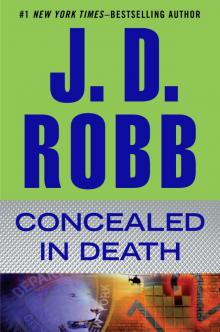 Concealed in Death
Concealed in Death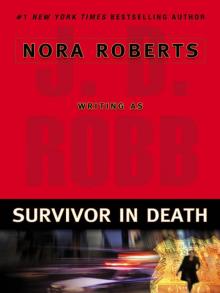 Survivor in Death
Survivor in Death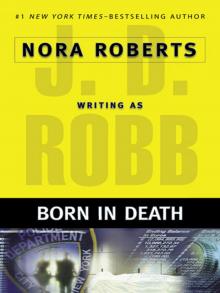 Born in Death
Born in Death Ceremony in Death
Ceremony in Death Indulgence in Death
Indulgence in Death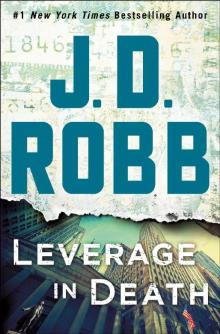 Leverage in Death
Leverage in Death Devoted in Death
Devoted in Death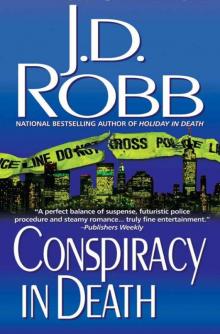 Conspiracy in Death
Conspiracy in Death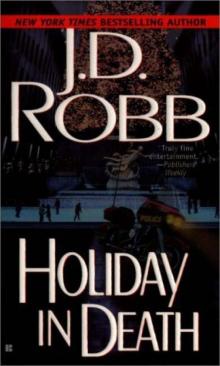 Holiday in Death
Holiday in Death The Unquiet
The Unquiet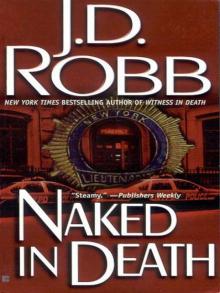 Naked in Death
Naked in Death Secrets in Death
Secrets in Death Seduction in Death
Seduction in Death Strangers in Death
Strangers in Death Creation in Death
Creation in Death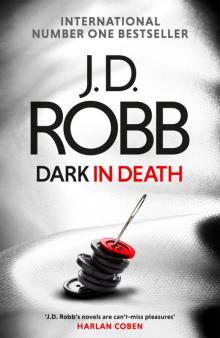 Dark in Death
Dark in Death Possession in Death
Possession in Death Visions in Death
Visions in Death Midnight in Death
Midnight in Death Innocent in Death
Innocent in Death Vengeance in Death
Vengeance in Death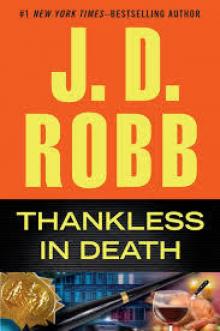 Thankless in Death
Thankless in Death Glory in Death
Glory in Death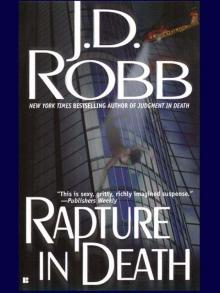 Rapture in Death
Rapture in Death Echoes in Death
Echoes in Death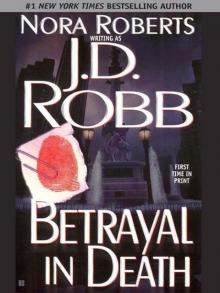 Betrayal in Death
Betrayal in Death Celebrity in Death
Celebrity in Death Immortal in Death
Immortal in Death Judgment in Death
Judgment in Death Ritual in Death
Ritual in Death Portrait in Death
Portrait in Death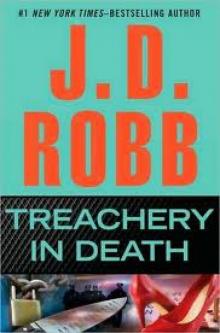 Treachery in Death
Treachery in Death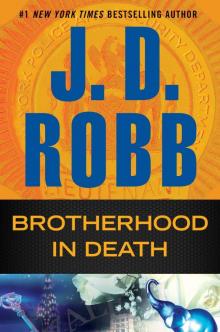 Brotherhood in Death
Brotherhood in Death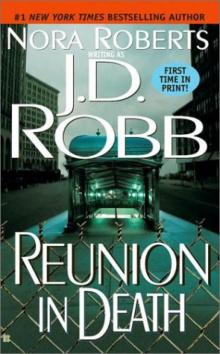 Reunion in Death
Reunion in Death Connections in Death: An Eve Dallas Novel
Connections in Death: An Eve Dallas Novel Imitation in Death
Imitation in Death New York to Dallas
New York to Dallas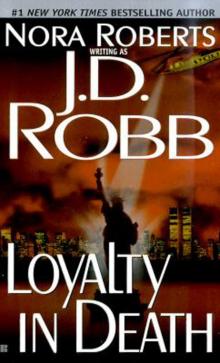 Loyalty in Death
Loyalty in Death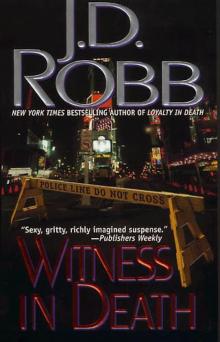 Witness in Death
Witness in Death Connections in Death
Connections in Death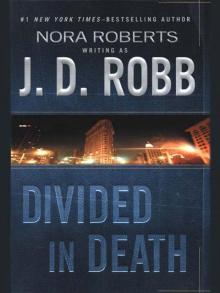 Divided in Death
Divided in Death Obsession in Death
Obsession in Death Purity in Death
Purity in Death Festive in Death
Festive in Death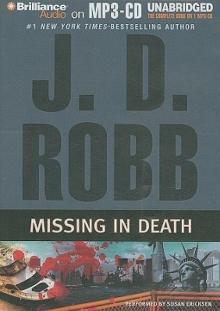 Missing in Death
Missing in Death Faithless in Death: An Eve Dallas Thriller (Book 52)
Faithless in Death: An Eve Dallas Thriller (Book 52)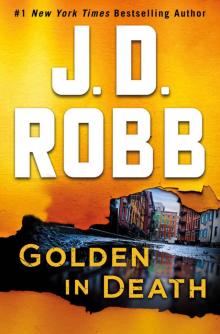 Golden in Death
Golden in Death The In Death Christmas Collection
The In Death Christmas Collection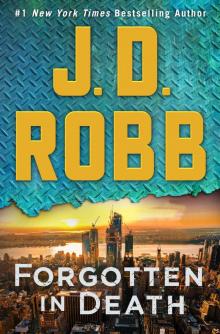 Forgotten in Death
Forgotten in Death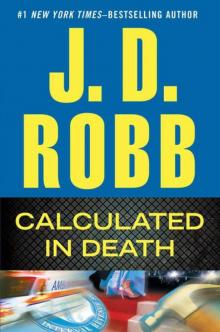 Calculated in Death
Calculated in Death Salvation in Death
Salvation in Death Interlude in Death
Interlude in Death Haunted in Death
Haunted in Death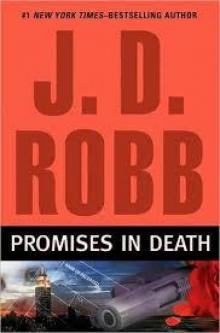 Promises in Death
Promises in Death In Death 07.5 - Midnight in Death
In Death 07.5 - Midnight in Death 44 Delusion in Death
44 Delusion in Death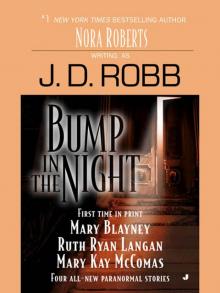 Bump in the Night
Bump in the Night The In Death Collection, Books 16-20
The In Death Collection, Books 16-20![[In Death 17] - Imitation in Death Read online](http://i1.bookreadfree.com/i/03/20/in_death_17_-_imitation_in_death_preview.jpg) [In Death 17] - Imitation in Death
[In Death 17] - Imitation in Death In Death 06 - Vengeance in Death
In Death 06 - Vengeance in Death Dead Of Night
Dead Of Night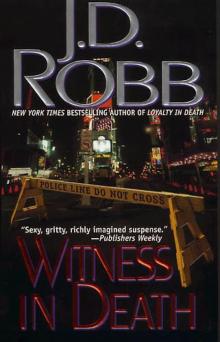 In Death 10 - Witness in Death
In Death 10 - Witness in Death![[In Death 16] - Portrait in Death Read online](http://i1.bookreadfree.com/i1/03/27/in_death_16_-_portrait_in_death_preview.jpg) [In Death 16] - Portrait in Death
[In Death 16] - Portrait in Death Possession in Death edahr-39
Possession in Death edahr-39 Remember When edahr-20
Remember When edahr-20 Big Jack
Big Jack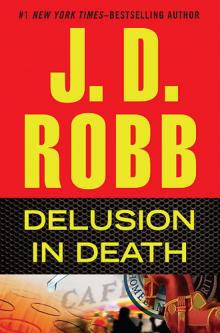 Delusion in Death edahr-44
Delusion in Death edahr-44 Missing in Death edahr-36
Missing in Death edahr-36 Origin in Death edahr-24
Origin in Death edahr-24![[In Death 18] - Divided in Death Read online](http://i1.bookreadfree.com/i1/04/03/in_death_18_-_divided_in_death_preview.jpg) [In Death 18] - Divided in Death
[In Death 18] - Divided in Death The Lost
The Lost![[In Death 05] - Ceremony in Death Read online](http://i1.bookreadfree.com/i1/04/01/in_death_05_-_ceremony_in_death_preview.jpg) [In Death 05] - Ceremony in Death
[In Death 05] - Ceremony in Death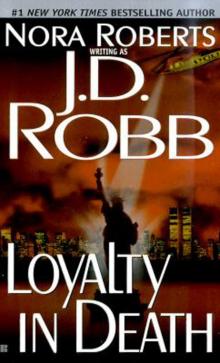 In Death 09 - Loyalty in Death
In Death 09 - Loyalty in Death Chaos in Death edahr-42
Chaos in Death edahr-42 In Death 12.5 - Interlude in Death
In Death 12.5 - Interlude in Death![In Death [47] Leverage in Death Read online](http://i1.bookreadfree.com/i1/04/01/in_death_47_leverage_in_death_preview.jpg) In Death [47] Leverage in Death
In Death [47] Leverage in Death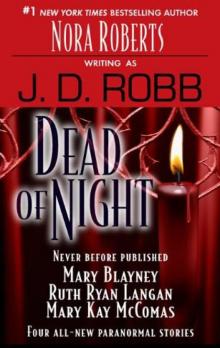 In Death - 24.50 - Dead of Night
In Death - 24.50 - Dead of Night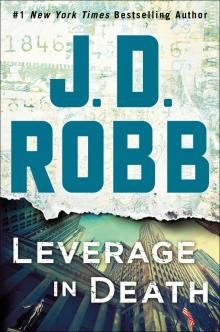 Leverage in Death--An Eve Dallas Novel
Leverage in Death--An Eve Dallas Novel![[In Death 24] - Innocent in Death Read online](http://i1.bookreadfree.com/i1/04/05/in_death_24_-_innocent_in_death_preview.jpg) [In Death 24] - Innocent in Death
[In Death 24] - Innocent in Death![[In Death 15] - Purity in Death Read online](http://i1.bookreadfree.com/i1/04/05/in_death_15_-_purity_in_death_preview.jpg) [In Death 15] - Purity in Death
[In Death 15] - Purity in Death The In Death Collection, Books 26-29
The In Death Collection, Books 26-29 New York to Dallas edahr-41
New York to Dallas edahr-41 The Other Side
The Other Side The In Death Collection 06-10
The In Death Collection 06-10![[In Death 08] - Conspiracy in Death Read online](http://i1.bookreadfree.com/i2/04/05/in_death_08_-_conspiracy_in_death_preview.jpg) [In Death 08] - Conspiracy in Death
[In Death 08] - Conspiracy in Death The In Death Collection, Books 21-25
The In Death Collection, Books 21-25 Memory in Death edahr-25
Memory in Death edahr-25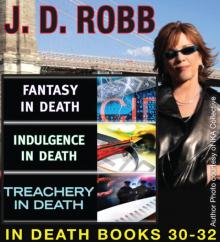 The In Death Collection, Books 30-32
The In Death Collection, Books 30-32 Down the Rabbit Hole
Down the Rabbit Hole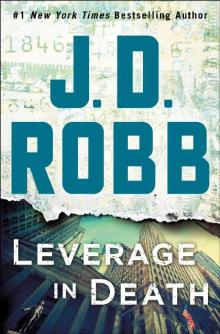 Leverage in Death: An Eve Dallas Novel (In Death, Book 47)
Leverage in Death: An Eve Dallas Novel (In Death, Book 47) The In Death Collection, Books 6-10
The In Death Collection, Books 6-10 The In Death Collection, Books 11-15
The In Death Collection, Books 11-15 Celebrity in Death edahr-43
Celebrity in Death edahr-43 Treachery in Death edahr-40
Treachery in Death edahr-40![[In Death 12] - Betrayal in Death Read online](http://i1.bookreadfree.com/i2/04/13/in_death_12_-_betrayal_in_death_preview.jpg) [In Death 12] - Betrayal in Death
[In Death 12] - Betrayal in Death The In Death Collection, Books 1-5
The In Death Collection, Books 1-5